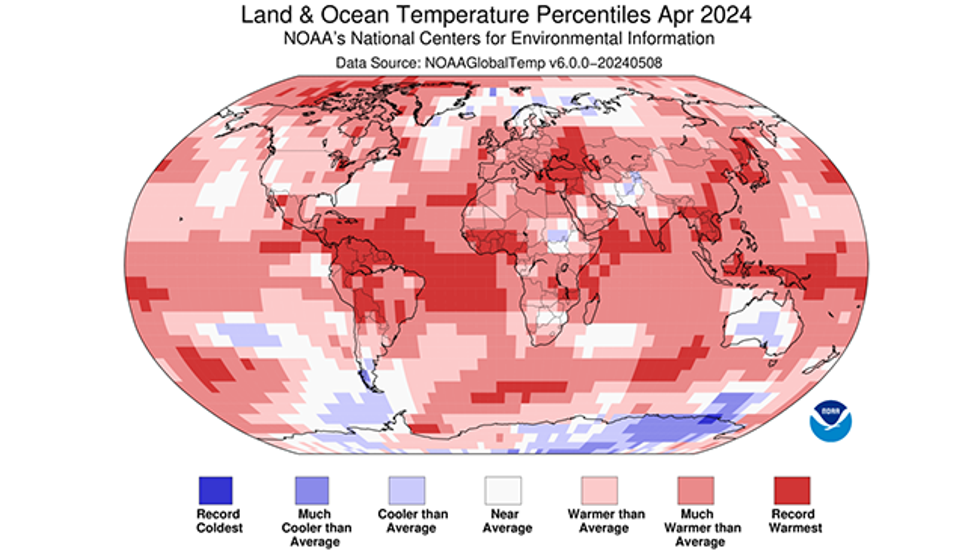April was Earth’s warmest on record, the latest in a stretch of monthly heat marks going back almost a year, according to newly-released data from four different agencies.
New month, another record: In a report released Tuesday, NOAA found April’s globally averaged temperature was 2.38 degrees Fahrenheit above the 20th century average, and about 0.32 degrees warmer than April 2020, the previous warmest April theircels dataset dating to 1850.
NASA’s Goddard Institute for Space Studies also found April 2024 was similarly warmer than April 2020 in its dataset dating to the late 19th century. The European Copernicus Climate Change Service (C3S) and Japan Meteorological Agency also found April was record-setting.
Globally averaged temperature data is synthesized from measurements taken by weather stations, ships, aircraft and satellites.
Eleven straight: April was the 11th consecutive month Earth set a new warm record for that month, a streak that started in June 2023.
That includes its two hottest months – July and August – as well as the planet’s four most anomalously warm months – September, October, November and December – according to the ECMWF’s Copernicus Climate Change Service (C3S). All of those led to a record-shattering warm year in 2023.
According to climate scientist Zeke Hausfather, the longest streak of record-setting monthly global temperatures is 16 straight months, from June 2015 through September 2016.
Daily global average surface air temperature (°C) in 2024 (red line) compared to 2023 (orange line), the 1940-2022 average (gray dashed line) and all other years since 1940 (various gray lines).
April’s record smashing heat: South America, much of southeast Asia and the Caribbean region had their hottest April. Europe and North America had their second hottest April and Africa its fourth hottest April, according to NOAA.
Weeks of searing heat sent temperatures into the triple digits in the Philippines, with nighttime lows only dropping into the mid-80s. China (just under 110 degrees), Myanmar (118 degrees) and Laos (110 degrees) set new national April heat records. Japan sweltered through three separate heat waves in April.
Late in the month, record April national highs were also set in Chad, Niger and Turkey, and earlier in the month in Bosnia and Herzegovina, Croatia and Slovenia, before Europe turned colder.
Ocean warmth still topping records: April marked the 13th consecutive month the planet’s oceans were record warm for that month, according to NOAA.
In particular, stretches of the Atlantic Ocean have been record smashing for over a year now. University of Miami tropical scientist Brian McNoldy noted the North Atlantic Ocean has been setting monthly records for 14 straight months. In early May, tropical scientist Richard Dixon noted the Atlantic Ocean between the Lesser Antilles and western Africa was as warm as it typically is in the middle of August.
Will 2024 top 2023? Unlike last year, 2024 began with a strong El Niño already established. While that is expected to vanish soon, it’s expected to have lagging effects.
NOAA’s April climate summary calculated a 61% chance that 2024 could be the planet’s record warmest year.
Berkeley Earth climate scientist Zeke Hausfather estimated a “roughly 66% chance” 2024 will top 2023’s record warmth.
Source: https://www.wunderground.com/article/news/climate/news/2024-05-03-record-warmest-april-earth-2024


